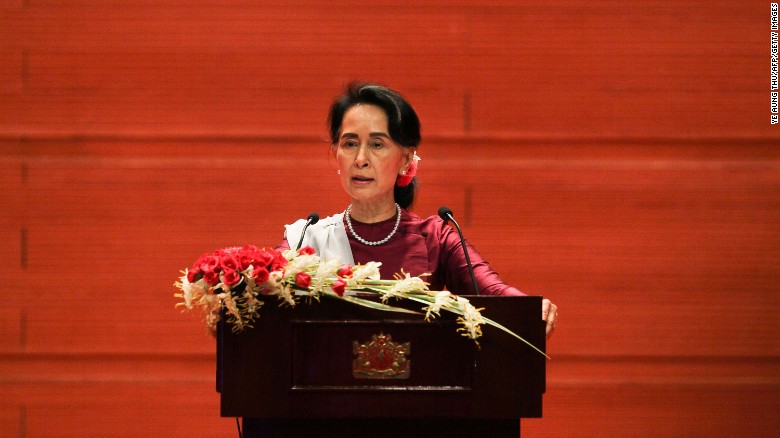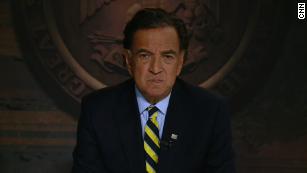- Joined
- May 25, 2011
- Messages
- 996
- Points
- 28
Ang Moh fear that their own luck will be same as Rohingya Ah Nehs soon.
https://edition.cnn.com/2018/03/07/politics/aung-san-suu-kyi-stripped-human-rights-award/index.html
Myanmar's Aung San Suu Kyi stripped of human rights award

By Laura Koran, CNN
Updated 0658 GMT (1458 HKT) March 8, 2018

Myanmar's de facto leader Aung San Suu Kyi has been accused of standing by while the Rohingya suffer.
Washington (CNN)Myanmar has responded to the stripping of a prestigious human rights award from de facto leader Aung San Suu Kyi by claiming the awarding institution was "misled and exploited."
The US Holocaust Memorial Museum museum announced Wednesday it was rescinding the prestigious Elie Wiesel Award granted to Suu Kyi in 2012 because she had failed to intervene in the humanitarian crisis unfolding in the country's northern Rakhine State.
In a statement, Myanmar's embassy in Washington, D.C., said "we immensely regret that the ... Holocaust Museum has been misled and exploited by people who failed to see the true situation in making fair judgment on the situation in Rakhine State."
Nobel laureate Suu Kyi, once a darling of the international human rights community, has been stripped of a number of prestigious awards amid allegations of ethnic cleansing of the country's minority Rohingya population.
More than 688,000 Rohingya refugees have fled Rakhine State since August. Myanmar's military has repeatedly denied claims it deliberately attacked Rohingya civilians, insisting instead that it is combating a terrorist insurgency in the province.

Bill Richardson: Myanmar's Suu Kyi 'has changed' 08:30
Reuters report alleges murder, arson by Myanmar's military
In a letter to Suu Kyi, museum director Sara Bloomfield insisted they "did not take this decision lightly," but were compelled to act in light of mass displacements and killings attributed to the country's security forces.
While Suu Kyi's political influence in Myanmar is limited under a power sharing agreement with the military, she has been widely criticized for not taking a stronger stand in support of the Rohingya following mass displacements and disproportionate violence, particularly given her global standing.
"As the military's attacks against the Rohingya unfolded in 2016 and 2017, we had hoped that you -- as someone we and many others have celebrated for your commitment to human dignity and universal human rights -- would have done something to condemn and stop the military's brutal campaign and to express solidarity with the targeted Rohingya population," Bloomfield wrote in the letter, posted to the museum's website.
Instead, Bloomfield concludes, Suu Kyi's political party "refused to cooperate with United Nations investigators, promulgated hateful rhetoric against the Rohingya community, and denied access to and cracked down on journalists trying to uncover the scope of the crimes in Rakhine State."

Three Nobel Peace Laureates accuse Myanmar of genocide 04:08
Rohingya in 'no man's land' to be sent back to Myanmar
Oxford honor previously rescinded
In November, Suu Kyi was stripped of the Freedom of the City of Oxford award, which honored her in 1997 for "her opposition to oppression and military rule in Burma." Suu Kyi studied at Oxford University's St Hugh's College as an undergraduate, but her portrait in the college has since been removed.
The Elie Wiesel Award is named for the late Holocaust survivor and author who is also Nobel Peace Prize laureate.
In her letter to Suu Kyi, Bloomfield closes with a pointed quote from Wiesel: "Neutrality helps the oppressor, never the victim. Silence encourages the tormenter, never the tormented."
https://edition.cnn.com/2018/03/07/politics/aung-san-suu-kyi-stripped-human-rights-award/index.html
Myanmar's Aung San Suu Kyi stripped of human rights award

By Laura Koran, CNN
Updated 0658 GMT (1458 HKT) March 8, 2018

Myanmar's de facto leader Aung San Suu Kyi has been accused of standing by while the Rohingya suffer.
Washington (CNN)Myanmar has responded to the stripping of a prestigious human rights award from de facto leader Aung San Suu Kyi by claiming the awarding institution was "misled and exploited."
The US Holocaust Memorial Museum museum announced Wednesday it was rescinding the prestigious Elie Wiesel Award granted to Suu Kyi in 2012 because she had failed to intervene in the humanitarian crisis unfolding in the country's northern Rakhine State.
In a statement, Myanmar's embassy in Washington, D.C., said "we immensely regret that the ... Holocaust Museum has been misled and exploited by people who failed to see the true situation in making fair judgment on the situation in Rakhine State."
Nobel laureate Suu Kyi, once a darling of the international human rights community, has been stripped of a number of prestigious awards amid allegations of ethnic cleansing of the country's minority Rohingya population.
More than 688,000 Rohingya refugees have fled Rakhine State since August. Myanmar's military has repeatedly denied claims it deliberately attacked Rohingya civilians, insisting instead that it is combating a terrorist insurgency in the province.

Bill Richardson: Myanmar's Suu Kyi 'has changed' 08:30
Reuters report alleges murder, arson by Myanmar's military
In a letter to Suu Kyi, museum director Sara Bloomfield insisted they "did not take this decision lightly," but were compelled to act in light of mass displacements and killings attributed to the country's security forces.
While Suu Kyi's political influence in Myanmar is limited under a power sharing agreement with the military, she has been widely criticized for not taking a stronger stand in support of the Rohingya following mass displacements and disproportionate violence, particularly given her global standing.
"As the military's attacks against the Rohingya unfolded in 2016 and 2017, we had hoped that you -- as someone we and many others have celebrated for your commitment to human dignity and universal human rights -- would have done something to condemn and stop the military's brutal campaign and to express solidarity with the targeted Rohingya population," Bloomfield wrote in the letter, posted to the museum's website.
Instead, Bloomfield concludes, Suu Kyi's political party "refused to cooperate with United Nations investigators, promulgated hateful rhetoric against the Rohingya community, and denied access to and cracked down on journalists trying to uncover the scope of the crimes in Rakhine State."

Three Nobel Peace Laureates accuse Myanmar of genocide 04:08
Rohingya in 'no man's land' to be sent back to Myanmar
Oxford honor previously rescinded
In November, Suu Kyi was stripped of the Freedom of the City of Oxford award, which honored her in 1997 for "her opposition to oppression and military rule in Burma." Suu Kyi studied at Oxford University's St Hugh's College as an undergraduate, but her portrait in the college has since been removed.
The Elie Wiesel Award is named for the late Holocaust survivor and author who is also Nobel Peace Prize laureate.
In her letter to Suu Kyi, Bloomfield closes with a pointed quote from Wiesel: "Neutrality helps the oppressor, never the victim. Silence encourages the tormenter, never the tormented."













